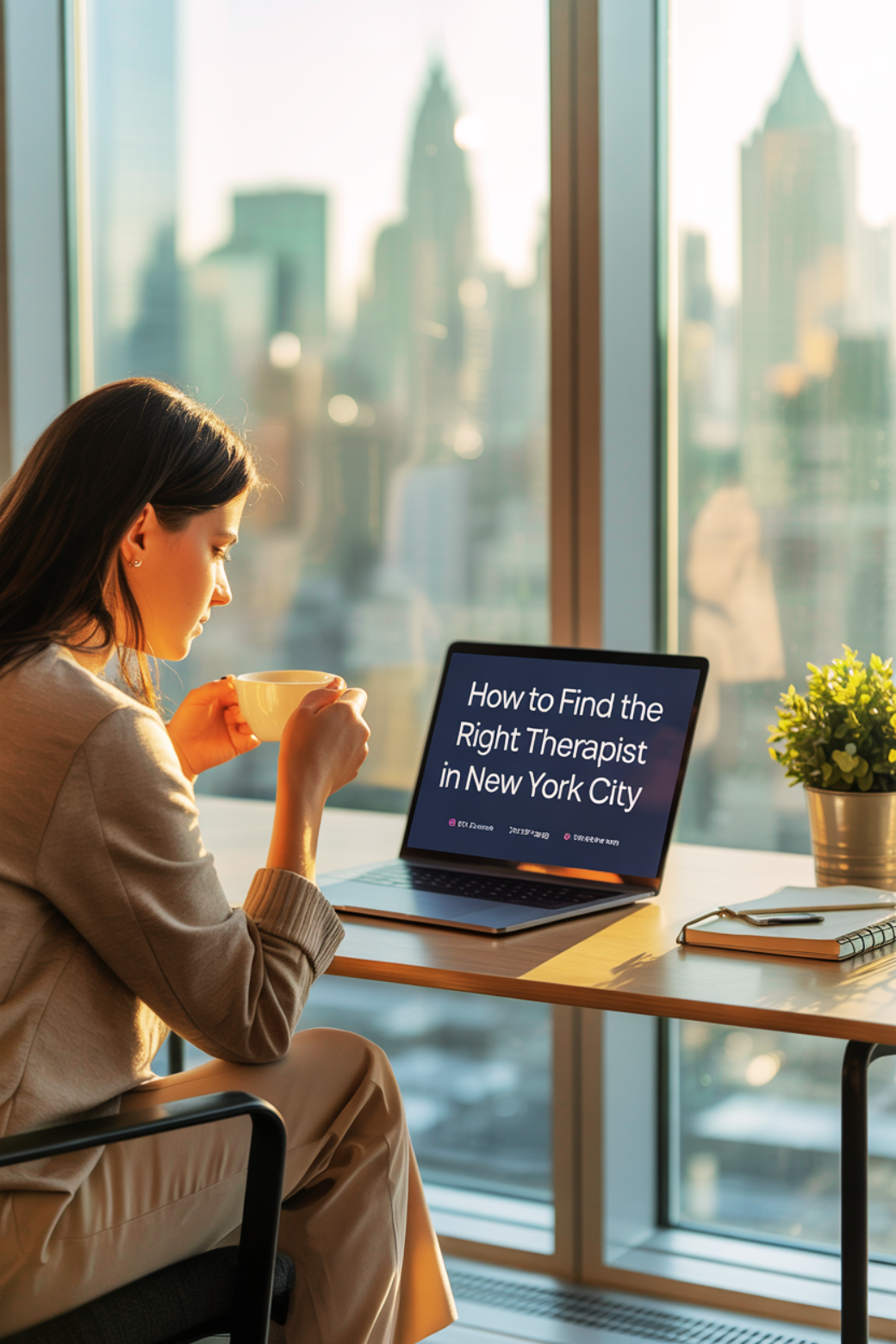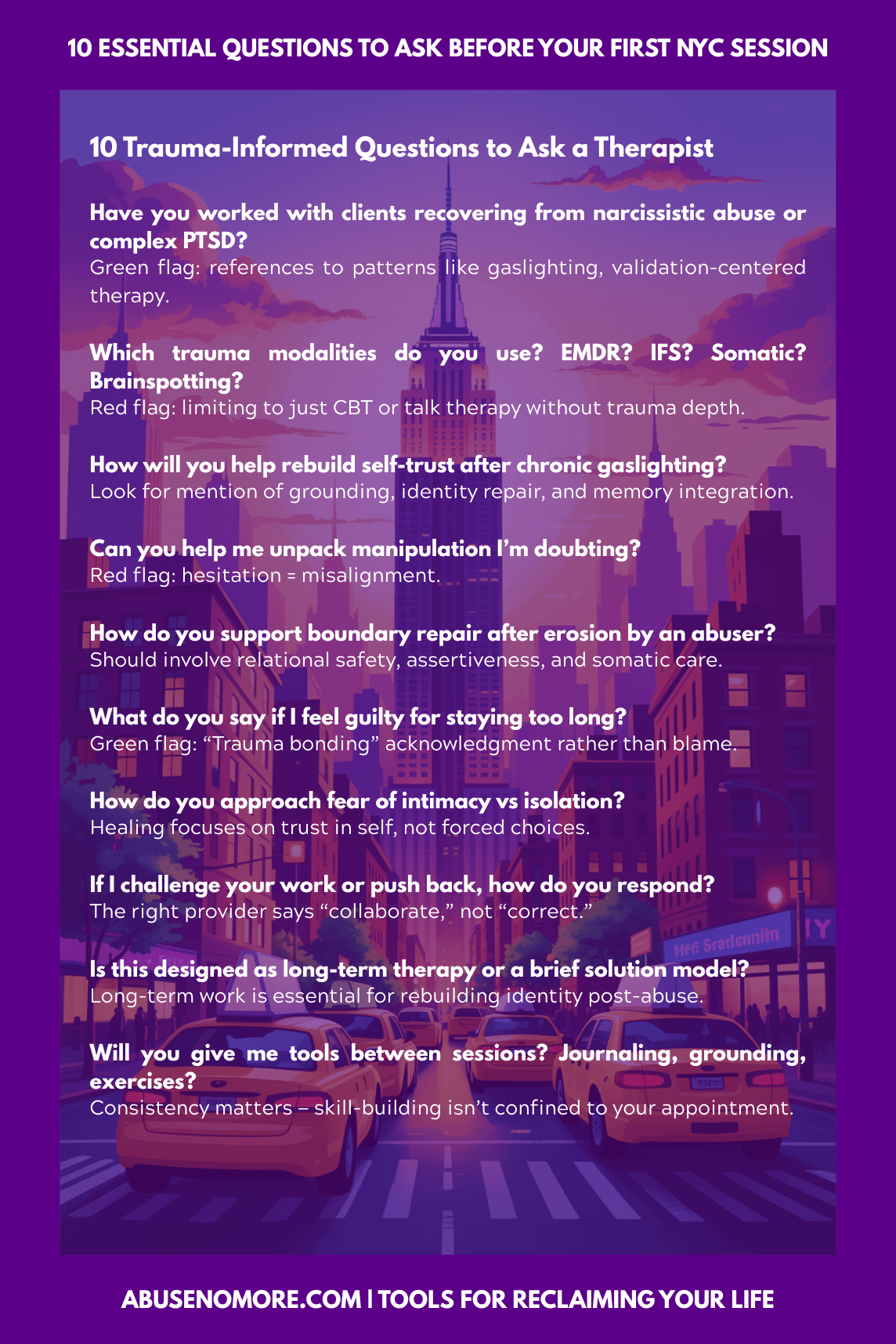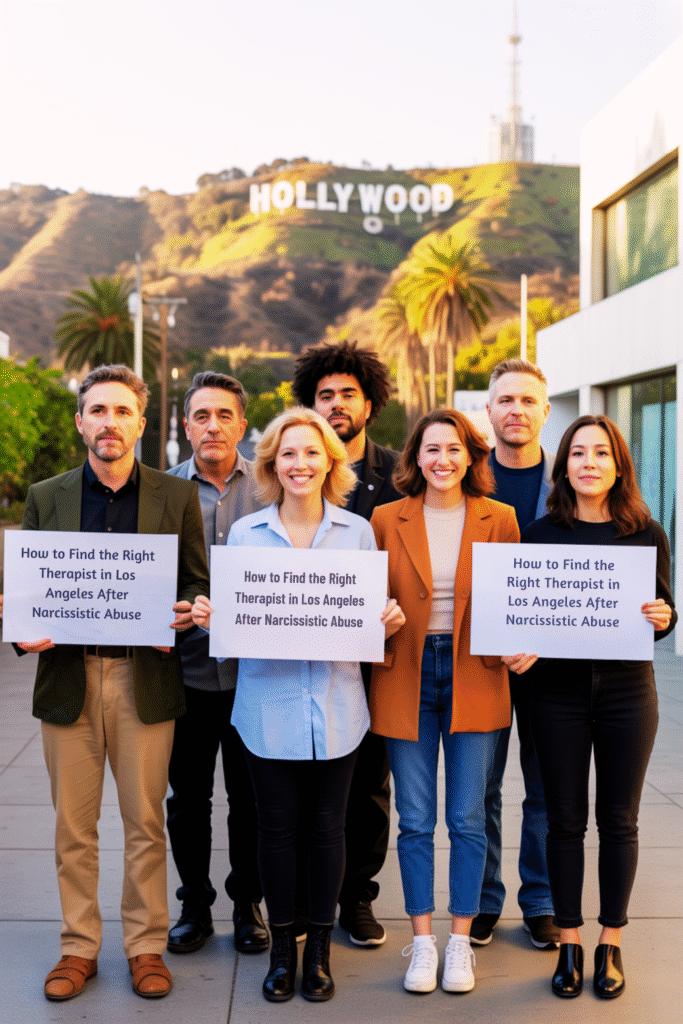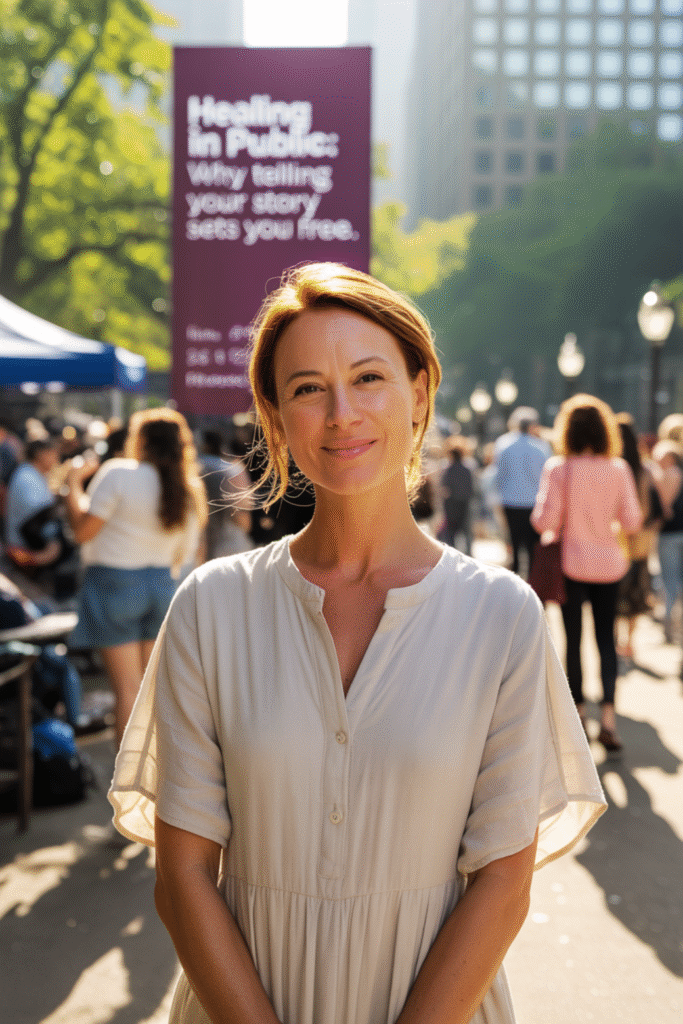Now Reading: How to Find the Right Therapist in New York City After Narcissistic Abuse
- 01
How to Find the Right Therapist in New York City After Narcissistic Abuse

How to Find the Right Therapist in New York City After Narcissistic Abuse
Abuse No MoreHealing & RecoveryJune 18, 2025
- Home
- Healing & Recovery
- How to Find the Right Therapist in New York City After Narcissistic Abuse

🇺🇸 How to Find the Right Therapist in New York City After Narcissistic Abuse
Narcissistic abuse doesn’t leave bruises—but the impact can feel seismic. NYC’s vibrant therapy landscape offers powerful resources, yet navigating options while recovering from gaslighting, trauma-bonding, and identity erosion can be overwhelming. Whether you’re in Manhattan, Brooklyn, Queens, or working from a laptop in a Midtown café, this guide serves as your compass through screening therapists, support groups, and healing tools in the city that never sleeps.
🛑 1. Not Every Therapist Understands Narcissistic Abuse
Many therapists are well-versed in anxiety, depression, or general relationship counseling—but trauma specialization, especially regarding narcissistic dynamics, is less common. A survivor screening therapists in NYC might face:
- Minimization: “Maybe it was just miscommunication.”
- Pathologizing: “Why are you still so upset?”
- Quick fixes: “Try forgiveness and move on.”
- Invalidation: “Are you sure it was abusive?”
What you need instead is trauma-informed care—modalities like EMDR, IFS, Brainspotting, somatic therapy, Schema Therapy, which address embodied trauma, nervous system regulation, and identity rebuilding. NYC hosts therapists who integrate multiple models for deep recovery.
🧠 2. What to Look For in a NYC Therapist
| Feature | Why It Matters | NYC Examples |
|---|---|---|
| Experience with narcissistic abuse & complex PTSD | No need to educate your therapist on gaslighting or emotional coercion. | Karina Babina (LMHC) works extensively on narcissistic abuse and integrates EMDR with DBT and psychodynamic therapy |
| EMDR, IFS, Somatic & Psychodynamic Therapy | These tackle trauma physically stored or chronically minimized. | Melanie Van Orden blends ketamine-, sensorimotor-, somatic-, and transpersonal therapies |
| Group therapy options | Peer validation builds safety and shared understanding. | NYC Counseling virtual narcissistic abuse group with live sessions |
| Accessible logistics | Native English, sliding-scale options, evening hours. | NYC Counseling offers same-week booking 7 AM–9 PM |
| Trauma-informed focus in public/private options | Some public clinics standardize CBT but lack deeper trauma work. | Clarity Therapy NYC provides trauma-informed packages |
🧊 3. 10 Essential Questions to Ask Before Your First NYC Session
- Have you worked with clients recovering from narcissistic abuse or complex PTSD? Green flag: references to patterns like gaslighting, validation-centered therapy.
- Which trauma modalities do you use? EMDR? IFS? Somatic? Brainspotting? Red flag: limiting to just CBT or talk therapy without trauma depth.
- How will you help rebuild self-trust after chronic gaslighting? Look for mention of grounding, identity repair, memory integration.
- Can you help me unpack manipulation I’m doubting? Hesitation = misalignment.
- How do you support boundary repair after erosion by an abuser? Should involve relational safety, assertiveness, somatic care.
- What do you say if I feel guilty for staying too long? “Trauma bonding” acknowledgment rather than blame.
- How do you approach fear of intimacy vs isolation? Healing focuses on trust in self, not forced choices.
- If I challenge your work or push back, how do you respond? The right provider says “collaborate,” not “correct.”
- Is this designed as long-term therapy or a brief solution model? Long-term work is essential for rebuilding identity post-abuse.
- Will you give me tools between sessions? Journaling, grounding, exercises? Consistency matters—skill-building isn’t confined to your appointment.
🏥 4. Public vs Private Therapy & Costs
Public options (through Medicaid/Medicare or sliding-scale clinics):
- Generally offer CBT or talk therapy.
- Trauma-informed care—especially EMDR or somatic work—is rare publicly.
Private therapy (most trauma specialists):
- Expect fees of $150–$300+ per session in NYC.
- Some offer sliding-scale or limited intro calls.
Online/hybrid:
- Many private clinicians offer virtual sessions—great for schedule flexibility.
💼 5. Recommended NYC Therapists & Clinics
Karina Babina (LMHC)
- Works with narcissistic trauma, PTSD, anxiety, depression.
- Integrates EMDR, DBT, mindfulness, psychodynamic therapy
- Located in Greenwich Village/SoHo (NYC 10012).
Dr. Michelle Carr (PsyD)
- Works with adolescents & adults impacted by narcissistic abuse, trauma, eating disorders.
- Interweaves emotional, physical, spiritual well‑being—and humor
Guided Epiphany / Crystal (LMHC)
- Narcissistic abuse, trauma, depression, anxiety—offers 15-minute free consult
Melanie Van Orden (Zencare featured)
- Uses ketamine-assisted therapy alongside somatic, sensorimotor, transpersonal, IFS, and trauma approaches
NYC Counseling Virtual Narcissistic Abuse Group
- Ongoing peer group facilitated by LCSW; same-week scheduling across 7 AM–9 PM
In-Person Group (Susan R. Epstein, LCSW) – Downtown Brooklyn
- $50–$100 per session; trauma-focused women’s issues & CPTSD support in 11242
Dr. Erin Falconer / James Stangarone / Karen Arluck / Kristine Danback
- Listed through IBelieveYourAbuse for “therapists, coaching, virtual + in-person”
Trauma Clinics: Clarity Therapy NYC, Holding Hope MFT, Repose NYC
- Offer EMDR, somatic experiential therapy, IFS, and holistic treatment for complex trauma
🔍 6. Peer Support & Group Options
- NYC Counseling’s Narcissistic Abuse Recovery Group (Virtual & In‑Person): weekly sessions, trauma-informed facilitation
- Downtown Brooklyn Group by Susan R. Epstein: $50–$100 sessions—peer-led, trauma-centered
- Thrive After Narcissistic Abuse (Meetup/Zoom): peer circles with neuro-energetic coaching and trauma-informed community building
- iBelieveYourAbuse Virtual Groups: free Zoom groups inclusive of orientation, LGBTQ-friendly, etc.
- Individual workshops: local NYC domestic-violence shelters/forums sometimes host survivor support circles.
📚 7. Why These Modalities Are Vital
- EMDR – evidence-based for PTSD/C-PTSD and emotional regulation
- IFS / Sensorimotor / Somatic Therapies – critical for rebuilding self-awareness, repairing traumatized parts of the self
- Ketamine-assisted therapy – can jumpstart healing pathways, esp. in entrenched trauma
- Group therapy – confers validation, integration, and shared understanding
🧭 8. Survivor-Led & Supplementary Support in NYC
- Thrive After Narcissistic Abuse Meetup: an inclusive, trauma-aware peer community
- Emotions Anonymous: peer-led twelve-step for emotional healing; used as adjunct support
- Domestic violence & codependency groups: Al‑Anon, Coda often host “Survivors of Emotional Abuse” tracks.
⚖️ 9. Cost, Access & Flooring Expectations
- Private therapy fees: $150–$300+ for specialist clinicians; sliding scales may be available.
- Group session costs: $50–$100 typical; virtual group fees vary.
- Insurance: few therapists are in-network; some out-of-network are eligible for reimbursement.
- Availability: expect waitlists for EMDR/trauma specialists—many offer virtual options.
- Formats: in-person (SoHo, UWS, Brooklyn), virtual (NYC Counseling, Thrive), hybrid clinics.
🛠 10. Your 6–Step Recovery Blueprint
- Clarify your healing goals: Do you lean toward body‑based modalities, trauma processing, or identity restoration?
- Reach out for discovery: Book 3–5 consults, ask your essential questions.
- Choose your anchor: Select a clinician you feel safe with—trust is healing.
- Add community: Join a group (NYC Counseling, Meetup, iBelieveYourAbuse).
- Build practices: Daily grounding, journaling, breathwork, polyvagal exercises.
- Evaluate after ~8–12 sessions: Are sessions moving you toward self-trust, boundaries, emotional regulation?
🧩 11. Self‑Care & Healing Practices
Healing isn’t confined to therapy. Complement with:
- Grounding rituals: polyvagal breathing, somatic noticing, mindfulness.
- Movement: yoga, dance, walk-and-talk therapy, body alignment.
- Journaling: track emotional states, boundary-setting, reality-checks.
- Peer validation: share your story, hear others’, dismantle isolation.
- Professional self-referral: therapists often recommend specific workshops/tools mid-therapy.
- Crisis resources: NYC Suicide Hotline (988), DV line (1‑800‑799‑7233), NYC shelters.
🏁 You didn’t imagine it.
The subtle weapons of narcissistic abuse left deep marks. NYC offers the space—but choosing healing pathways requires intentionality.
From Karina Babina’s EMDR work to Melanie Van Orden’s integrative psychospiritual therapy; from live peer groups via NYC Counseling to Susan Epstein’s trauma group in Brooklyn—you have multiple entry points. Combine therapy with community and daily practices to rebuild trust in you.
You survived. Now take New York as your stage to reclaim your narrative—one grounded breath, one healing session, one supportive group at a time.
Ask Eve™: 7 Questions NYC Survivors Ask About Therapy After Narcissistic Abuse
1. How do I know if my therapist actually understands narcissistic abuse?
If you’ve ever left a session feeling more confused than when you walked in, you’re not alone. Too many NYC therapists are well-meaning but under-equipped to recognize narcissistic abuse for what it is: psychological warfare. You shouldn’t have to explain gaslighting or define emotional coercion while you’re still healing from it. That’s like limping into the ER and being asked to diagnose your own wound.
✅ IMC Method™ Breakdown:
Identify:
Ask how they work with gaslighting, trauma bonds, and identity loss. Real specialists don’t dodge those terms — they meet them head-on. NYC providers like Karina Babina or Clarity Therapy name these dynamics openly.
Minimize:
If you find yourself educating your therapist instead of feeling understood, that’s not therapy — that’s emotional labor. And you’ve done enough of that already.
Control:
Say this during the consult:
“How do you differentiate high-conflict relationships from narcissistic abuse?”
If they pause or deflect, they’re not the one.
2. Can I actually afford good trauma therapy in NYC?
It’s true: NYC’s therapy rates can feel like rent prices in disguise. But not every good therapist charges $300 a session. And not every $300 therapist is good. There are options — you just have to know where to look and what to ask for. Peer groups, discovery calls, and virtual options can make quality trauma care accessible, even here.
✅ IMC Method™ Breakdown:
Identify:
Sliding-scale clinicians exist — and many offer hybrid or group models that cut your cost without cutting depth.
Minimize:
Don’t assume price equals quality. Some of the most effective trauma work is happening in Brooklyn basements and Zoom rooms — not Park Avenue suites.
Control:
Tap into NYC Counseling’s virtual peer group, or book a free consult with Guided Epiphany or iBelieveYourAbuse’s network while vetting options.
3. What if I’m not sure it was “really” abuse? He never hit me.
That sentence — “he never hit me” — is one of the most common ways survivors minimize their pain. Narcissistic abuse isn’t always loud. Sometimes it’s a whisper that eats away at your sense of self. If you’re second-guessing your memory, instincts, or emotions… that’s the damage. That’s the abuse.
✅ IMC Method™ Breakdown:
Identify:
Emotional abuse can be invisible — but its impact is undeniable. Therapists trained in somatic, psychodynamic, or IFS models know how to help you unpack the damage, not dismiss it.
Minimize:
You’re not “dramatic.” You’re finally listening to your nervous system, and it’s been trying to speak for a long time.
Control:
In consults, ask:
“How do you approach clients who don’t feel sure it was abuse?”
If they offer gentle exploration instead of clinical detachment — that’s your person.
4. How do I rebuild self-trust after being gaslit for years?
Gaslighting doesn’t just make you doubt what happened. It makes you doubt yourself. It turns your instincts into question marks. It erodes your memory and reshapes reality. Rebuilding trust in yourself after that isn’t optional — it’s sacred. But not every therapist is equipped to guide that process.
✅ IMC Method™ Breakdown:
Identify:
You need a provider who talks about identity repair, memory integration, and grounding — not just symptom management.
Minimize:
Therapy that skips past self-trust recovery is like patching the roof while the foundation crumbles.
Control:
Ask:
“What’s your approach to helping survivors reclaim their inner authority after narcissistic abuse?”
They should mention body-based, relational, or parts-work strategies.
5. What if I’m too intense, too damaged, or trauma-dump too much?
Let’s be real: that fear didn’t start in therapy — it started with someone who made you feel too much when all you did was feel deeply. A safe therapeutic space should feel like a release, not a performance. You’re not “too intense.” You’re unprocessed. And in the right room, that’s welcome — not overwhelming.
✅ IMC Method™ Breakdown:
Identify:
Look for bios that mention CPTSD, complex trauma, or relational recovery. They’re expecting you to be layered, messy, and raw — and that’s a good thing.
Minimize:
If you shrink yourself to avoid making your therapist uncomfortable, the healing won’t land. You don’t need a cheerleader. You need a trauma witness.
Control:
Ask this in consult:
“What happens if I get overwhelmed or emotional during sessions?”
The answer should sound like permission, not performance management.
6. I’ve done therapy before — why didn’t it work?
Because talk therapy isn’t trauma therapy. Period. A lot of survivors get stuck in cognitive loops — analyzing, over-explaining, journaling — but never accessing the root. That’s not a failure on your part. That’s a mismatch between what you needed and what you got.
✅ IMC Method™ Breakdown:
Identify:
If your past therapist never used words like EMDR, somatic, IFS, or trauma-informed, they were treating the symptoms — not the source.
Minimize:
You didn’t fail therapy. Therapy failed you.
Control:
Ask future therapists:
“How do you address trauma stored in the body?”
If they say, “We don’t really focus on that,” politely thank them and close the Zoom.
7. What if I can’t find the right therapist right now — what do I do in the meantime?
Healing doesn’t wait for perfect conditions. It starts wherever you are — with grounding exercises, peer groups, breathwork, and routines that make your body feel safe again. The right therapist will join your journey, not start it. So if you’re in the “between” space? That’s still part of the recovery arc.
✅ IMC Method™ Breakdown:
Identify:
Acknowledge that waiting for the right fit doesn’t mean waiting to begin. You’re allowed to start healing now.
Minimize:
You’re not stalled — you’re setting the stage. That’s strategy, not stagnation.
Control:
Build your rhythm:
- 1x weekly consult or therapist search
- 1x weekly group (Thrive, EA, Meetup)
- Daily nervous system care (breathwork, journaling, music, walks)
When your therapist arrives, you’ll already be in motion.
🏁 Final Word from Eve:
The right therapist won’t just ask, “What’s wrong?”
They’ll say, “What happened to you — and how do we help you feel whole again?”
You’re not too broken. You’re not too much. You’re just overdue for support that’s fluent in your story. And in NYC, that support exists — you just need the map. Keep going. You’re not lost.
🌐 7 Survivor Resources (Real-World, Free, and Actionable)
When therapy access is delayed, too expensive, or unavailable, support doesn’t stop. These resources give you tangible ways to start rebuilding, regulating, and reclaiming yourself — right now.
If emotional regulation feels like a daily rollercoaster, EA offers a grounding space. With in-person and Zoom-based 12-step groups across NYC (and globally), EA creates a trauma-aware, spiritually inclusive setting for survivors navigating codependency, emotional suppression, or isolation. No diagnosis or insurance needed.
One of the only platforms fully built around naming narcissistic abuse. From virtual therapist directories to LGBTQIA+-friendly Zoom support groups, this space affirms survivors through community, education, and clinician-matching — all designed to dismantle silence and shame.
3. Thrive After Narcissistic Abuse (Meetup)
This NYC-based Meetup group facilitates in-person and online gatherings, centering nervous system safety, peer validation, and gentle reentry into connection. Survivors here often bring lived experience and trauma-informed insight — it’s not just a group, it’s a mirror.
4. Body Keeps the Score Workbook (Free Version)
While the book itself is a cornerstone, this free workbook version (endorsed by trauma clinicians) walks survivors through somatic reconnection, memory processing, and body-based reflection exercises without a therapist. Highly recommended for journaling, breathwork, and private integration.
5. Polyvagal Exercises for Safety & Connection (PDF)
This free 28-page booklet by Deb Dana distills the science of polyvagal theory into bite-sized practices that help survivors shift out of shutdown, freeze, or hypervigilance — and back into grounded safety. Perfect for daily nervous system care.
6. The Center for Nonviolent Communication (CNVC)
If you’re rebuilding your ability to communicate, express needs, and set boundaries without fear of reprisal, CNVC offers live trainings and free guides on conflict navigation through empathy — not appeasement.
7. National Domestic Violence Hotline
Even if you don’t think you qualify, the NDVH provides chat, text, and phone support for anyone experiencing emotional, verbal, financial, or psychological abuse. Their 24/7 line (1-800-799-7233) is confidential, non-judgmental, and trauma-informed.
🔗 Abuse No More Resources
1. Gaslighting: The Ultimate Mind Game
If your therapist never talked to you about reality erasure, this article will. It unpacks gaslighting through real survivor stories and shows how to identify, minimize, and control its effects using the IMC Method™. Pairs well with self-trust rebuilding resources.
2. Ask Eve™: Why Do I Feel Lonelier With Him Than When I’m By Myself?
This question hits home for so many survivors in therapy: feeling abandoned within a relationship. This page offers a deep narrative breakdown plus the IMC Method™ applied directly to emotional abandonment — a perfect link from your NYC guide’s sections on boundary repair and somatic recovery.
















